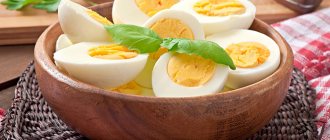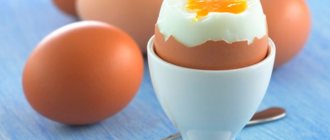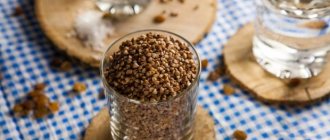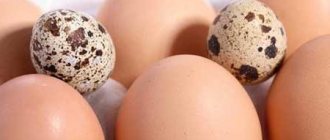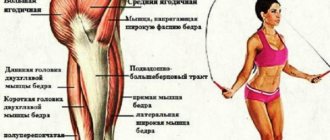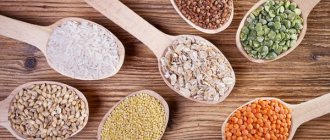Eggs are a frequent guest on many people's tables. They are added to a huge number of dishes and eaten on their own. You can boil and fry eggs in a variety of ways. The eggs of not only birds, but also some species of reptiles, such as turtles, are considered edible. Due to the availability and taste, people prefer to feast on chicken. Quail eggs are consumed much less frequently, and duck, turkey, ostrich or goose eggs are eaten extremely rarely.
The product is common and popular, but also unique. It is absorbed in the human body almost completely (97%). The structure of eggs is such that only one part is the white, and the rest is the yolk. The latter contains proteins, fats, and cholesterol. Protein that turns white during cooking consists of only 10% protein itself, and the rest is water.
Calorie content of eggs
| In a raw chicken egg | 158 kcal per 100 g |
| One medium raw egg | 70 kcal |
| In one boiled egg | 50-70 kcal |
| In a soft-boiled egg | 70 kcal |
| Hard-boiled egg | 50 kcal |
| In one fried egg in vegetable oil | 125 kcal |
| In a quail egg | 16-17 kcal |
| In a raw ostrich egg | 118 kcal per 100 g |
There are about 158 kcal per hundred grams of product. Here it is necessary to take into account that eggs are bought and eaten individually, so you should focus on the size, method of preparation, and type. A medium egg has 70 calories, a large egg has 80 calories, and a very large egg has 90 calories. These indicators are valid only for raw products; during cooking, the energy value changes.
A fried egg already contains 125 kcal. This applies to a product that is fried using vegetable oil. If you boil it soft-boiled, then the calorie content will be less, that is, 70, and hard-boiled - 50 kcal. It should be borne in mind that the protein contains three times less calories than the yolk.
A quail egg is small in size and weight, which varies from 10 to 12 grams. Since it is possible to buy this product, which is becoming quite popular, in almost every supermarket these days, the issue of its energy value becomes relevant. One quail egg contains 16-17 kcal.
What happens if you eat three eggs every day?
Compound. Calorie content of protein and yolk
The exact content of proteins, fats and carbohydrates depends on the weight of the egg. Average values in grams:
| Substance | For 100 g. | For 1 piece (70 g) |
| Squirrels | 12,5 | 8,7 |
| Fats | 12,8 | 9 |
| Carbohydrates | 0,7 | 0,5 |
White and yolk differ in composition and have different calorie content.
Photo: lifealth.com
Liquid protein takes up most of the egg (about 60%). The name of the component gives a clear idea of its composition. Egg white (protein) is a complex of compounds of the same name mixed with water that determine the nutritional value of the product. In the human body, protein performs a construction function and ensures the development of muscle tissue.
Egg protein contains a minimum of fat and has a low calorie content - 25 Kcal per 1 piece, or 60 Kcal per 100 g.
The yolk is half the size of the white. It contains more fat and has high energy value. The average calorie content of 1 piece is 75 Kcal, per 100 g – 375 Kcal.
The central part of the egg is a cluster of useful components. The composition of the yolk includes vitamins A, D, E, B, folic and nicotinic acid.
Among mineral substances, phosphorus and iron lead in quantity. Potassium, magnesium, calcium, zinc, and iodine are present in smaller volumes.
The uniqueness of eggs is explained by the presence of lecithin and niacin. These substances reduce the activity of bad cholesterol in the yolk and make the composition of the product as balanced as possible.
Beneficial features
The rich mineral composition of proteins and yolks explains their high nutritional value.
Egg protein is essential for muscle development and recovery.
Photo: toptengama.com
Due to their high content of vitamin A, phosphorus and iron, eggs help strengthen bones and teeth, increase the strength and elasticity of hair and nails.
Folic acid is responsible for the normal development of the fetus during pregnancy.
Vitamins D and E strengthen the immune system. Leticin and niacin reduce the risk of developing cancer and cardiovascular diseases, and prevent the accumulation of cholesterol on the walls of blood vessels.
B vitamins support performance, activate metabolic processes, and have a beneficial effect on the nervous system and mental activity.
Possible harm
The negative impact of eggs manifests itself in the case of their excessive and inattentive consumption. Things to consider:
- Protein-rich foods increase the load on the kidneys and liver. Excessive eating of eggs can disrupt the functioning of internal organs.
- The high cholesterol content in the yolk is the main argument against eggs. Nutritionists agree with them on this issue. Useful lecithin will not relieve problems in case of excessive consumption of the product. Excess cholesterol is fraught with slagging of blood vessels and impaired cardiac function.
- The disease salmonellosis threatens lovers of raw eggs. Poultry products are a common source of contamination with dangerous bacteria. Their entry into the human body is fraught with blood poisoning and severe digestive upset.
In this video from the “Live Healthy” program, together with Elena Malysheva and her team of doctors, you will learn in what form it is better to eat eggs and why, how they are useful for our body.
Thermal cooking of eggs is a guarantee of the safety of the product purchased at retail outlets.
Nutritional value of eggs
Determined by the beneficial substances included in the product. Eggs contain minerals required by the human body, as well as amino acids and vitamins. The product owes its nutritional value and value to the following substances:
- active provitamin A;
- vitamin D, the concentration of which is second only to fish oil, which is known for its benefits to humans;
- vitamins E and group B, and, along with B1 and B2, the yolk is rich in choline (B4);
- calcium, iodine, copper, phosphorus, iron;
- cholesterol, which does not pose a threat to health, as it is balanced by lecithin;
- polyunsaturated fats, which, like the cholesterol contained in eggs, do not cause any harm to health.
Thus, it turns out that both cholesterol and fats that enter the body with eggs are absolutely safe. In addition, the product provides a person with approximately 96% of minerals, as well as useful vitamins.
How good are eggs for weight loss?
Chicken eggs have a number of properties, the presence of which in the product promotes weight loss:
- Rich in protein - a filling product, and therefore their consumption for breakfast helps to reduce appetite and, as a result, gain calories.
- Protein foods require high energy costs during digestion (about 30% of the total calorie content of protein consumed), and therefore are useful for losing weight. For comparison: for carbohydrates and fats this figure is 10%.
- The amino acids present in the egg improve metabolic processes in the human body.
However, these properties apply to a lesser extent to raw foods.
Eating eggs on a diet
Every person who wants to gain weight and adheres to a diet is invariably interested in the question of whether this product is compatible with the process of losing weight. In this matter, you should listen to the advice of nutritionists. Many experts recommend eating 2 to 3 eggs per week. On low-carb diets, this amount can be increased.
Including eggs in your diet can help you lose weight and support your immune system. Hard-boiled, they are found in most popular diet programs. Among them are Protasova, Atkins, by blood group, Kremlin and, of course, protein.
Eggs and diet food
Eggs are one of the natural foods included in the list of low-calorie foods. This product is often included in many diets and is often used for medicinal purposes.
Studies have shown that people who eat two boiled eggs every day in the morning, on average, reduce the calorie content of their diet per day by about 300 kilocalories.
Nutritionists recommend consuming this product at least 2-3 times a week; this will help not only lose weight, but also strengthen your body. There are certain diets for weight loss that include a distinct number of eggs per day. Eggs do an excellent job of normalizing metabolism in the body.
How to choose the right eggs
To answer this question, you need to decide whether regular table eggs or diet eggs will be eaten. The ability to read the labels allows you to distinguish both of these products from each other. On the territory of the Russian Federation, the letter “D” is placed on a dietary egg, the shelf life of which does not exceed a week, but “C” is placed on a table egg, the sale of which is given about 25 days.
The weight of the egg is marked with the second marking symbol in ascending order with the numbers 1, 2 and 3. Selected ones, weighing from 65 to 75 g, have the letter “O” on the shell, premium ones with a weight of more than 75 g - the letter “B”. However, when purchasing a product, be sure to pay close attention to when the egg was “released.” If the product is packaged in a container, it must be opened to check its integrity.
The quality or taste of eggs, as many mistakenly believe, does not depend in any way on color. It ranges from pure white to light brown.
Improves brain and eye health
Eggs provide your body with important essential nutrients and antioxidants that support brain and eye health.
Kholin
Choline is an essential nutrient for many critical processes in your body.
Your body does produce some choline, but not in large quantities. Therefore, you should get choline from your diet to avoid deficiency (14).
However, most people today do not consume enough of it (15, 16).
Choline is critical to maintaining a healthy nervous system as it helps produce acetylcholine, a neurotransmitter involved in memory and learning (17).
Choline is important throughout your life. It promotes fetal brain development and memory, as well as cognitive function in older adults (15, 18).
It is also vital for pregnant women, as adequate choline levels may reduce the risk of neural tube defects in the fetus (19).
Choline is found in the yolk - one large hard-boiled egg contains 147 mg of choline, which is 27% of the daily value. In fact, eggs are the most concentrated source of choline (14, 15).
Lutein and Zeaxanthin
Lutein and zeaxanthin are two antioxidants best known for their role in eye health.
They fight the harmful effects of free radicals that can accumulate in your eyes (20, 21).
Lutein and zeaxanthin have been shown to slow the development of cataracts and protect against age-related macular degeneration (macular degeneration) (22, 23).
They may even protect your eyes from harmful blue light (24, 25).
Egg yolks are an excellent source of these two carotenoids.
Plus, thanks to the fat contained in the yolk, your body seems to absorb lutein and zeaxanthin very well (26, 27).
Summary:
Egg yolks are an excellent source of choline, which is essential for brain health and development. They are also rich in lutein and zeaxanthin, antioxidants that promote eye health.
Quantitative norm for egg consumption
The average person, if we look at the generally accepted nutritional standard, should consume about three hundred eggs annually. This is approximately from five to six pieces per week. For people suffering from high cholesterol, this amount should be halved.
Yolks are introduced into children's diets at the age of seven months. It is permissible for two- and three-year-old children to be given two to three yolks per week; a similar number of eggs can be consumed from four to six years of age.
Speaking about the number of eggs, you need to remember that they are included in baked goods, mayonnaise and other food products, including homemade ones.
Cholesterol level
For many years, eggs have had a bad reputation due to their high levels of cholesterol.
It's true that eggs contain a lot of cholesterol. One large hard-boiled egg contains 212 mg of cholesterol, which is 71% of the RDA (1).
However, recent studies show that dietary cholesterol has very little effect on blood cholesterol levels (7, 8).
For most people, dietary cholesterol is not associated with cardiovascular disease risk and does not increase total cholesterol or “bad” LDL cholesterol (9, 10).
In fact, consuming eggs may improve your levels of “good” HDL cholesterol (7, 11, 12).
Additionally, two studies that examined data from more than 100,000 healthy adults found that eating one whole egg per day was not associated with an increased risk of cardiovascular disease (12).
However, people with diabetes should exercise caution when consuming eggs, as some studies suggest that eating 7 eggs per week may increase the risk of developing cardiovascular disease (13).
Ultimately, more research is needed on the relationship between egg consumption and the risk of cardiovascular disease in people with diabetes.
Summary:
Although hard-boiled eggs are high in cholesterol, research shows that dietary cholesterol does not negatively affect blood cholesterol levels in most people. Eggs have been found to improve cholesterol profiles by increasing levels of "good" HDL cholesterol.
Popular egg recipes
The uniqueness of eggs lies in the fact that they can be prepared in completely different ways, which invariably affects both calorie content and taste. Those on a diet are recommended to include this product in their diet exclusively soft-boiled, since it is in this form that eggs have the minimum calorie content.
Eggs are prepared according to the following recipes:
- Boiled soft-boiled and hard-boiled. In the first case, the eggs are boiled from 2 to 3, and in the second - from 7 to 8 minutes.
- Fried. Scrambled eggs are cooked in a frying pan using a small amount of vegetable oil with the addition of salt and ground black pepper. It can be fried on both sides or on one, resulting in a wonderful fried egg. If you shake the eggs well, then ordinary scrambled eggs will turn out to be scrambled.
- Omelette. A light and popular dish made from eggs beaten with milk. It is salted and peppered to taste and then fried in a frying pan. To make the dish tastier, add fresh bell peppers, tomatoes, cheese, and ham. The “stuffing” is selected according to your preferences.
- Poached. These are eggs that are boiled peeled, that is, without shells. This cooking method was invented by the French.
Finding a recipe that suits your taste is not difficult.
Dietary recipes for weight loss
Offers the simplest and most delicious dishes with eggs for weight loss
Egg salad with cherry tomatoes
- Wash the lettuce leaves, dry them and place 1-3 on a plate.
- Boil 3-4 eggs, peel, cut in half and place on lettuce leaves.
- Cut the same number of tomatoes and place them on plates next to the eggs.
- Mix 1 tbsp olive oil, balsamic vinegar, Provençal herbs (to taste), chopped garlic clove and a pinch of salt until smooth.
- Pour the resulting dressing over the eggs and tomatoes just before serving.
The dish can be additionally decorated with herbs.
Omelette in the oven
A tender and light omelette with vegetables is the most dietary and healthy dish.
- Beat 5 eggs, mix with 1 tbsp. milk and a pinch of salt.
- Grease a baking dish with a thin layer of vegetable oil. Pour the whipped mixture into it.
- Cook for 20 minutes. in an oven preheated to 150 degrees.
You can serve the finished dish with bran bread.
Taking during a diet
This product is used for weight loss or during a diet. This is possible for the following reasons:
- a low-calorie product that makes it possible to prepare a dietary dish that does not increase weight;
- low price;
- preparing a large number of dishes that are eaten for breakfast or dinner;
- the presence of proteins consumed by women who want to weigh less;
- muscle growth, due to which the body becomes toned, while decreasing in mass due to a decrease in fat.
During the diet you should use the following recipes:
- For breakfast, scrambled eggs are prepared in a slow cooker. Bell peppers, tomatoes and onions are added there. Cooking time: 5 minutes.
- During dinner or lunch, an omelet with cottage cheese is prepared. Vegetable salad is served at the same time.
- Hard-boiled eggs are a good afternoon snack.
- Egg-curd casseroles or meringues are prepared as dessert.
How many calories are in different types of eggs?
Most often we use chicken eggs (selected, ordinary or small) and quail eggs for food. How many calories are in an egg depends on its type. Let's look at specific examples. A selected chicken egg weighs about 60 grams. Its calorie content is 94-100 kilocalories. An ordinary chicken egg weighs 50-60 grams. Its calorie content is approximately 78-85 kilocalories in one piece. Small chicken eggs weigh less than 50 grams. Their calorie content per piece is 63-77 kilocalories. You can find out the type of chicken dietary egg by reading the label on the package. Of course, the true calorie content can only be determined by laboratory research. The data we provide is average and varies depending on the time of year, the breed of bird, its age, and the composition of feed at the poultry farm. 100 grams of any chicken egg contains approximately 157-160 kilocalories. There are even more calories in 100 grams of quail eggs - about 168-170. But the eggs of this variety are much smaller. Their weight is about 9-12 grams. How many calories are in the egg of this type of bird? No more than 20 kilocalories in one piece. Other types of eggs are used less frequently in food. A duck or goose egg contains 185 kilocalories per 100 grams, a turkey egg - 165 kilocalories, an ostrich egg - 118 kilocalories. How many calories are in an egg depends primarily on its weight.
Egg powder
The calorie content of egg powder is extremely high. This product contains about 542 kilocalories per 100 grams. Of course, we never eat this product in large quantities and in its pure form. Otherwise, soon we would all face an acute problem of obesity. The calorie content of dry egg whites and yolks also varies greatly. 100 grams of dry protein contains approximately 336 kilocalories. This is a lot, but still significantly less than in dry yolks. Their calorie content is almost 625 kilocalories per 100 grams.
Composition of a boiled chicken egg
Despite all the controversy, many people prefer to have a boiled egg for breakfast. And for good reason: its nutritional value is unique.
Its composition according to the BZHU is as follows:
- proteins - 5.51 g;
- carbohydrates - 0.49 g;
- fat - 4.65 g;
- potassium - 55 mg;
- sodium - 122 mg.
- water - 73 g;
- saturated fatty acids - 3 g;
- ash - 1 g;
- disaccharides - 0.7 g;
- cholesterol - 575 mg.
The energy value of 100 g of product is 160 kcal.
From one medium boiled chicken egg, the body receives 68 kcal.
